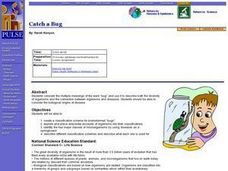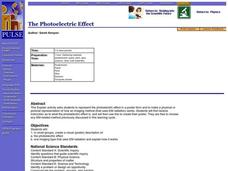Curated OER
World Geography: Who am I?
High schoolers are able to provide a basic description of one country that has arsenic in its water supply. They are able to locate these countries on a map. Students explore the majors countries that have been affected by arsenic...
Curated OER
Mammals, Mammals--Everywhere!
Students explore the habitats of mammals and their physical characteristics. They research examples of mammals that must deal with daily changes in their habitat and how they cope with them. In small groups, students create a table...
Curated OER
Gaining Familiarity with Magnetism
Students discuss their perceptions of magnetism and explore the background ideas of magnetism.
Curated OER
Industrialization of the American Landscape - Major Project
Students consider the role of industry on the American landscape from a variety of perspectives. They investigate a simulated case study. They investigate a chemical spill catastrophe. Students write an informative pamphlet to assist...
Curated OER
A Mixed Bag of Apples
Learners recognize that individuals and groups have both common and different attributes and that each individual may be a member of many different groups. They recognize, appreciate and value individual differences and perspectives.
Curated OER
The Box
Tenth graders identify and interpret the perceptions of guilt and innocence. Then they explore the concept of ownership and think about the use of space as it relates to these terms. Students also use Freeze Frames, Mime and Facial...
Curated OER
Puppets and Tolerance
Students study tolerance in a puppet activity. In this tolerance lesson, students watch a puppet performance to learn about tolerance, diversity, and understanding.
Curated OER
"For the Birds" [part I]
Students identify birds that appear in Chinese and Japanese art, learning about
their physical characteristics, classifying them according to scientific principles, and exploring their habitats and migration patterns. This is part one...
Curated OER
Plastics and Rubber: What's the Difference?
Students observe how to classify things into groups based on physical properties. In this plastic and rubber lesson students group and sort items to help them to better identify properties.
Curated OER
Termite Biology
Students explore the physical characteristics, distribution and habitat of termites. The instructional activity focuses on the termite as a social creature contrary to most other insects.
Curated OER
The Homestead Act
Eighth graders analyze the Native American's viewpoint of the Homestead Act. Using one Native American group who lived in Nebraska, they write a letter to the editor of a local newspaper discussing the Homestead Act and how it affected...
Curated OER
Freckle Juice
Working in groups of four, the students will use the computer to draw an imaginary potion that will cure other children their age from physical traits (they can not control) including all ingredients and one text box.
American Museum of Natural History
Thinking in the Three Dimensions
Discover different dimensions with paper folding. Pupils first read about zero, one, two, and three dimensions, and then learn about the fourth dimension, time. They then use origami to create models of shapes in three dimensions and use...
Curated OER
Arsenic and Human Health
Ninth graders concentrate on arsenic poisoning as an example of the connections among health, geography, and geology as they develop a persuasive presentation about the dangers of arsenic in the drinking water, targeting a specific...
Curated OER
Genetic Phenotypes of the Super Heros
Students learn that genetic differences exist in all of us. That diversity is what makes us unique as individuals. Phenotypes are the physical characteristics that we develop from our genotype (our genetic makeup). Both the environment...
Curated OER
The Photoelectric Effect
After some online instruction, chemistry aces use their creative abilities to produce a poster describing the photoelectric effect and one type of imaging technology that uses electromagnetic radiation. This simple, straightforward...
University of Chicago
Addressing Stereotypes
How is a stereotype defined, and what are some mechanisms we can use to combat negative stereotyping? Your young historians will discuss how and why stereotyping occurs, as well as consider the roots of modern conceptions of...
Curated OER
Blubber Gloves
The ways that animals adapt to their environments is quite remarkable. In this life science lesson, fifth graders take a look at some of the ways that aquatic animals that live in Arctic or Antarctic waters survive. They perform an...
Curated OER
Electromagnetic Spectrum
Students define electromagnetic radiation, list major categories and uses of electromagnetic waves, identify potential health risks with electromagnetic waves, and demonstrate understanding of Plank's constant by solving quantitative...
Curated OER
Observing First Impressions
High schoolers explore their own personal qualities. In this social awareness lesson plan, students explore their identities as results of genetics and environments. High schoolers also discuss first impressions and their reliability.
Curated OER
Biomedical Imaging
Students use guided questions and research to compare two biomedical imaging methods. they effectively present their findings to the class. Students use new technical knowledge to summarize and compare new techniques with those they...
Curated OER
Chernobyl
Students list some of the health effects of radiation exposure. They are engaged in a unit on nuclear power by demonstrating the potential environmental health risks involved.
Curated OER
Ecosystems and Remote Sensing
Young scholars obtain remote sensing data to compare and contrast global biomass data with global temperature data.
Curated OER
Perfumania
Students identify various geometric shapes. Apply the given formulas to determine the volume of these shapes. Design their own container to conform to specifications provided. Use their knowledge of volume formulas and shapes to compute...



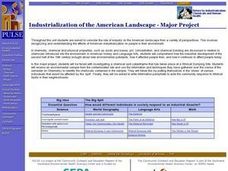

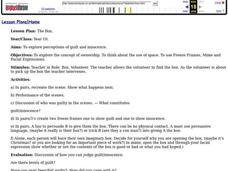
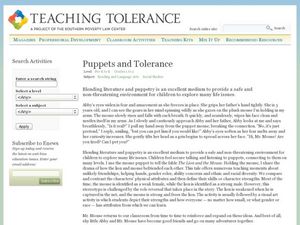
!["For the Birds" [part I] Lesson Plan "For the Birds" [part I] Lesson Plan](http://content.lessonplanet.com/resources/thumbnails/122462/large/cgrmlwnvbnzlcnqymdeymtaxny0ynji5lwd4n2h5by5qcgc.jpg?1414222903)





